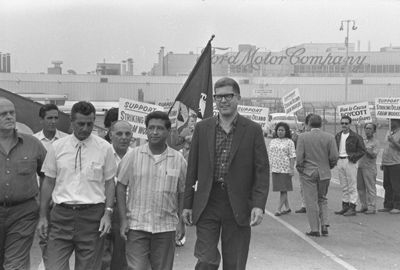Teresa Barnett and her staff of three at UCLA Library’s Center for Oral History Research have their work cut out for them: Document the history of Los Angeles and its environs. Since its founding in 1959, the center has amassed oral histories by 1,216 interviewees on the history of the film industry, mayoral politics, the civil rights movement and institutions like UCLA, among dozens of subjects. Researchers, book authors, filmmakers and many others tap into the center’s recordings and transcripts.  Yet every passing day adds to the rising tide of history to be documented. Barnett and her staff already have their hands full with projects to document L.A.’s Chicano movement, the Service Employees International Union’s "Justice for Janitors" campaign and the origins of the Internet, to name just a few. So the center is tapping a growing number of community archivists and citizens who are learning how to conduct oral history interviews in free, two-day workshops led by Barnett and her colleagues. Sharing these skills, she hopes, will foster new, high-quality oral history projects to expand the documentation of all facets of L.A.'s history.
Yet every passing day adds to the rising tide of history to be documented. Barnett and her staff already have their hands full with projects to document L.A.’s Chicano movement, the Service Employees International Union’s "Justice for Janitors" campaign and the origins of the Internet, to name just a few. So the center is tapping a growing number of community archivists and citizens who are learning how to conduct oral history interviews in free, two-day workshops led by Barnett and her colleagues. Sharing these skills, she hopes, will foster new, high-quality oral history projects to expand the documentation of all facets of L.A.'s history.

Oral history interviews with Marnesba Tackett document her 26-year campaign to desegregate L.A.'s schools. Photos courtesy of UCLA Library Department of Special Collections' Los Angeles Times Photographic Archive.
When they started about 10 years ago, said Barnett, "these workshops were envisioned for grad students" who do narrative interviews as part of their research. But the emails she sent out to announce the class to departments and study centers across campus were forwarded to an expanding universe beyond UCLA. "Gradually, Barnett said, "the workshops started filling up with more outside people as word trickled out."
While grad students do attend the workshops, as many as half of the 25-35 participants are people from the community. "People come for a variety of reasons," said Barnett. "They come because they want to document things that are near and dear to them." Many are doing family histories or are archivists for institutions.
In recent years, participants have included an archivist documenting the history of the 100-year-old Western Costume Company; a group researching the "Hollywood Riviera," a section in the South Bay that began as a seaside community for movie stars and moguls; a volunteer conducting oral interviews for the June Mazer Lesbian Archives; and a filmmaker researching a historical period when Native American children were sent to boarding schools to be "Americanized." Then, there was the man who was tapping his and others’ memories of Highway 40, a road that once crossed the continent, but has dwindled to a stretch between Park City, Utah, and San Francisco.  "If you just learn a little bit of the basics you can conduct much better interviews than if you’re in there on your own with absolutely no training," said Barnett. "It’s not rocket science in the sense of being so abstruse that you have to study it for decades, but it requires good social skills, thoughtfulness and knowledge of the subject."
"If you just learn a little bit of the basics you can conduct much better interviews than if you’re in there on your own with absolutely no training," said Barnett. "It’s not rocket science in the sense of being so abstruse that you have to study it for decades, but it requires good social skills, thoughtfulness and knowledge of the subject."

UCLA's collection includes interviews with former United Auto Workers director Paul Schrade (in foreground, right), shown here in 1967 with United Farm Workers leader Cesar Chavez and other union members picketing the Ford Motor Co. plant at Pico Rivera.
Most important is learning to let the person being interviewed do the talking.
"The key thing in oral history is close listening and not crowding the person — not finishing their sentences," she said. "You promote a reflective atmosphere that really allows them to talk. It’s their narrative. You want them to tell their story, and you draw that out. You help make it richer and fuller."
Workshop participants are encouraged to donate a copy of their work to the Oral History Research Center or another archive to make the materials available to a broad audience for years to come. "We have the facilities to preserve electronic recordings over many years," said Barnett. Older taped interviews are stored in a controlled environment, and digital interviews are kept on a computer server with multiple backups.
In too many cases, recorded histories end up "sitting on CDs in a desk drawer or on a hard drive, but those CDs or that hard drive will be superceded by something else and those interviews will just die."
Among the materials donated to the center are a series of interviews with Iranian Jews in L. A. Another series documents the stories of participants in a state program that provided art instruction to jail inmates; these oral histories complement additional historic materials held by the UCLA University Archives and the UCLA Ethnomusicology Archive.
Barnett said she’d like to see more oral histories being collected in immigrant and other under-documented communities.
"For those communities whose history hasn’t been enshrined for decades, this is a way to start doing that," said Barnett.
______________________________________________________________________
The center will host its next workshop on how to do an oral history project on Oct. 5. To sign up or to obtain more information, email Barnett at tbarnett@library.ucla.edu.




